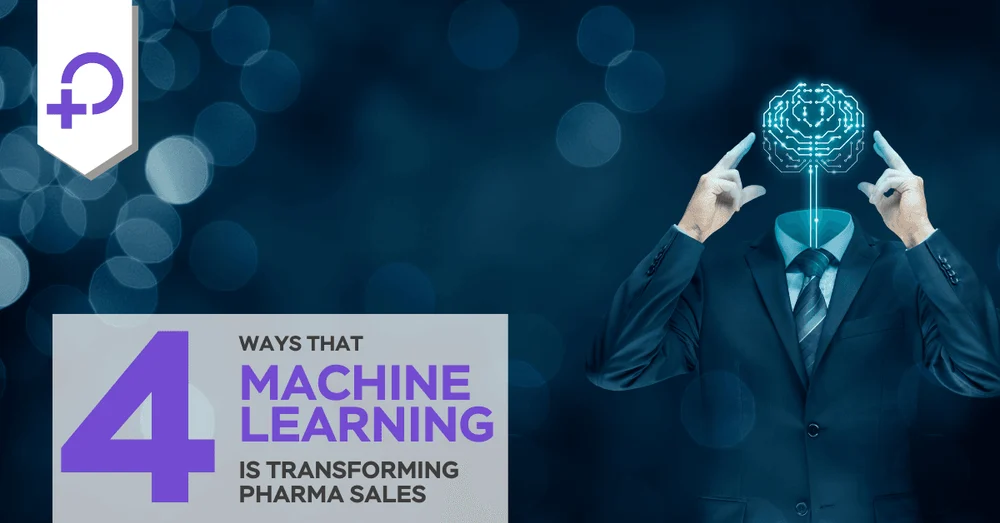4 Ways That Machine Learning is Transforming Pharma Sales | P360

by Brian Fitzgerald | Last Updated: March 25, 2022 | 1 min read
Artificial Intelligence (AI) is blowing up in ALL markets globally and is poised to take over the healthcare market1. In fact, the AI healthcare market is expected to reach $6.6 billion by 2021. Additionally, clinical AI applications will create $150 billion in annual savings in the U.S. by 2026. The rewards are not limited to the clinical setting, however. McKinsey2 estimates that big data and machine learning (a critical application of AI) will generate a value of up to $100 billion annually. Researchers base this massive value on "better decision-making, optimised innovation, improved efficiency of research/clinical trials, and new tool creation for physicians, consumers, insurers, and regulators."
Pharma sales are just one of many areas that will see huge gains from the strategic integration of machine learning.
What is Machine Learning?
Machine Learning (ML) is one of those buzzwords that has emerged during the age of "big data." Machine learning is essentially the process and technology behind teaching a computer to act like a human.

It is the science of feeding computers streams of data that comes from observations and real-world interactions so that the computer can mimic human actions and logic. As an application of AI, machine learning allows a computer system to learn and improve from experience automatically, without being programmed to do so. Thus, the name "machine learning."
How does the process of "learning" work?
Machine learning occurs by giving computer systems access to vast amounts of data that they can process and learn from themselves. It starts with observations of data, which could include examples, experiences, or direct instruction. The machine looks for patterns in the data in order to make future decisions. The goal is for this to be an automatic process with no human intervention.

Here are 4 Key Ways That Machine Learning is Transforming Pharma Sales From the Inside Out
Healthcare has seen tremendous reform over the last decade, and pharmaceutical reps are not immune to the effects of that reform. More physicians are part of a larger integrated healthcare group. The Affordable Care Act has transitioned healthcare models from a fee-for-service model to a value/outcomes structure. This changing regulatory environment and economic conditions have left doctors with less time to learn about potentially life-saving drugs. Old sales tactics simply do not work.
Now is the time to make the smart shift to a sales strategy that targets the right physicians with the right message at the right time.
Here are four ways AI is helping pharma reps to do just that:
1. AI Helps Reps Become a Trusted Advisor
"Sales rep" is really a misnomer for pharmaceutical representatives. They are tasked with becoming an educator, a reliable source, and a trusted advisor. Building relationships is key to pharmaceutical companies. In addition to knowing about their own products, reps must familiarize themselves with the conditions the drugs treat, as well as competing products. They must know about complex diseases, such as cancer, and all forms of treatment. Including oral, injectables, and biological formulations. To be effective, they must also know specifics about the physician they are seeing. What if your pharma rep could get a summary of personalized data applicable to every physician on their lead sheet? Through machine learning, AI can analyze a tremendous amount of data and make appropriate recommendations about what information and approach will have the most impact on a particular physician. For example, AI may look at historical data from a physician's prescribing habits, demographics of the area he or she serves, managed care impact on the drug they are selling, new treatments that are available, and what pharmaceuticals other physicians within the same specialty are using.
With that data, machine learning will enable AI technology to recommend specific sales collateral and leave-behinds that would most appeal to that specific doctor. With this information in hand, sales reps are 100 percent more prepared for an in-person meeting and can save time by not having to search for and collect data and materials. AI-driven chatbots are becoming increasingly popular, providing your reps with easy-to-use voice and text-based chatbots can increase productivity and access to information.
2. ML Provides Dynamic Segmentation
Reps have always used segmentation to personalize engagement with a particular group of physicians. However, machine learning enables highly complex segmentation. Machine learning can tract countless variables that the human brain is just incapable of doing. Predictive customer behavior is key to engagement, and machine learning provides the level of segmentation that can accomplish a very specific predictive analysis. AI considers the context of numerous variables, giving reps individualized information in real-time.

Here's a simple example:
AI could provide a pharma rep with a lead sheet that shows neurologists within a 40-mile radius that prefer Mondays after 3 pm, and who are interested in a new treatment for dementia. Machine learning is capable of segmenting lists into even greater detail, providing reps with critical intel and specialized meeting strategies.
3. ML Enables Reps to Spend More Time in the Field
The more time that sales reps spend doing paperwork or other admin tasks, the less time that they are selling and building relationships. Machine learning can provide a virtual assistant model that maximizes a rep's time in the field.
Consider this scenario:
Your sales reps have various "smart forms" available, which allow them to enter data that automatically connects to a customer relationship management system (CRM). They can enter relevant data, in real-time, and totally get rid of time-consuming paperwork. Now, that data can also feed into an AI-powered tool with machine learning capabilities. The result will be customized recommendations for each prescriber. Your sales reps can also receive a report that tells them exactly what their next contract should focus on.

Here's another example:
Field reps often spend time taking inventory of products at a pharmacy. Data is meticulously transcribed into a CRM system. AI image-recognition solutions are already being used to automate this process, giving reps more time to engage with providers and pharmacists. Product data is captured in real-time, verifying contract compliance and identifying any problems quickly.
Explore More Relevant Articles on P360
- How Embracing New Technology Makes Your Pharma Sales Easier
- An Essential Guide To Effective Managed Care In Commercial Pharma
- 7 Reasons Why Dedicated Pharma Sales Operations Solution is Critical
- 5 Common Causes of Drug Recalls and How to Plan Ahead
- How to Prepare Your Team for End-of-Year Pharma Sales Force Alignment
4. AI Acts Like a Personalized Mentor
Salespeople, in general, tend to work independently. However, what if they could measure and learn from the successes and failures of each other? What if you could identify the habits of your best reps, and train others to use them?
AI does that.
For example; if your top pharma reps use a particular presentation, AI will gather that data and machine learning will enable the system to make the decision to use that presentation for other reps seeing a similar client. It's essentially the equivalent to your pharma reps meeting for hours each day to discuss what's working and what's not, instead of only comparing notes during quarterly meetings or annual national sales conferences. Best practices are identified and shared through AI, and machine learning uses that data to make real-time decisions based on where the client is in the sales cycle. Improve outcomes by elevating the performance of the entire team. Think of AI as a personal trainer and mentor for each pharma rep.
The Sales Cycle is Changing One Sale At A Time
Among other things, Artificial Intelligence and Machine Learning are simplifying some of the most time-consuming aspects of the pharma industry:
- Increased productivity.
- Simplify the sales process.
- Have sales teams that are better prepared for anything in the field.
- Give reps more time in the field.
- Enhance cross-team collaboration.
Have you thought about your AI strategy yet?
Want to learn more about how Microsoft-powered AI and ML can help improve your business and simplify the pharma sales funnel? Get in touch with us today for a free consultation!
References:
1. https://towardsdatascience.com/15-artificial-intelligence-ai-stats-you-need-to-know-in-2018-b6c5eac958e5
2. https://www.mckinsey.com/industries/pharmaceuticals-and-medical-products/our-insights/how-big-data-can-revolutionize-pharmaceutical-r-and-d